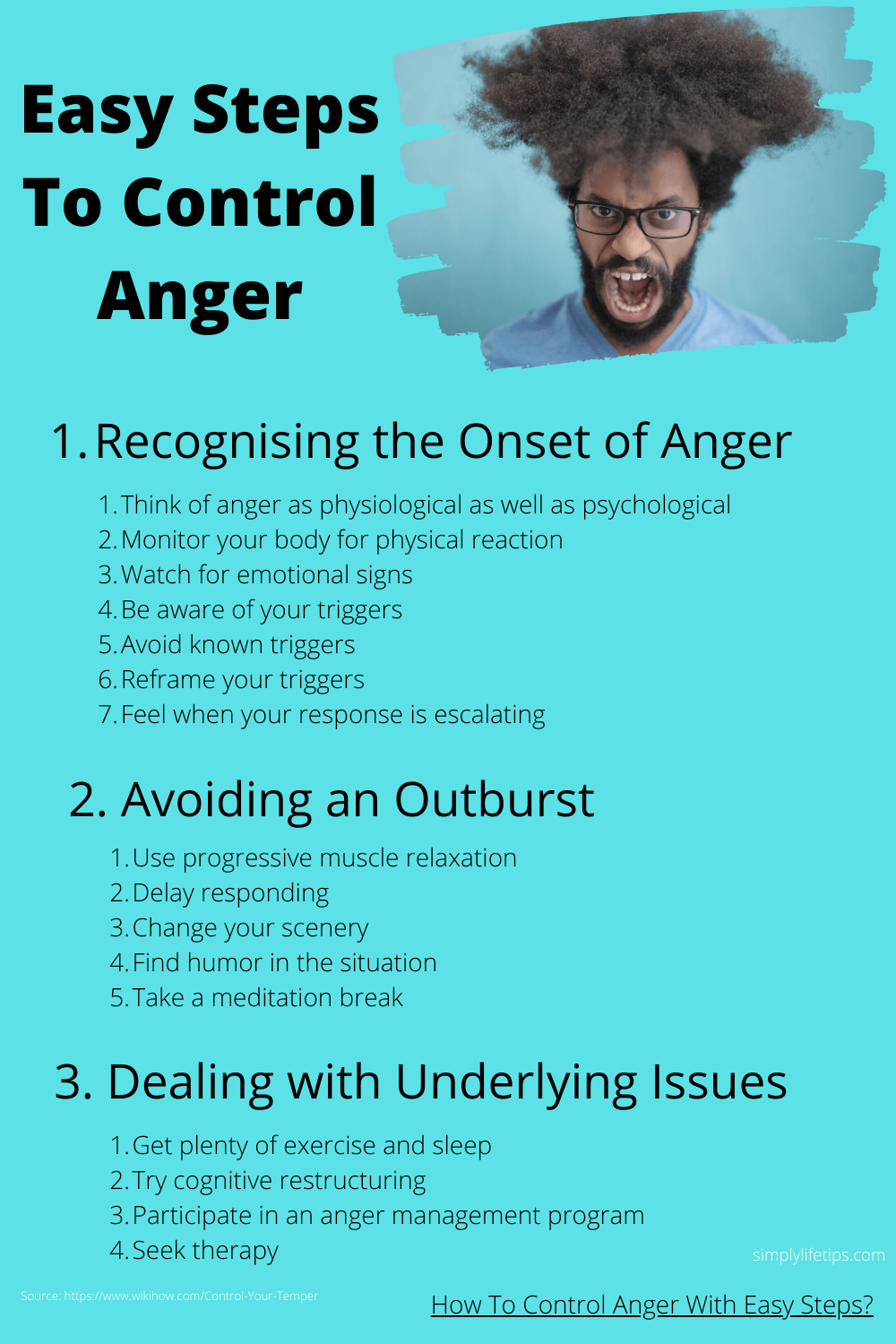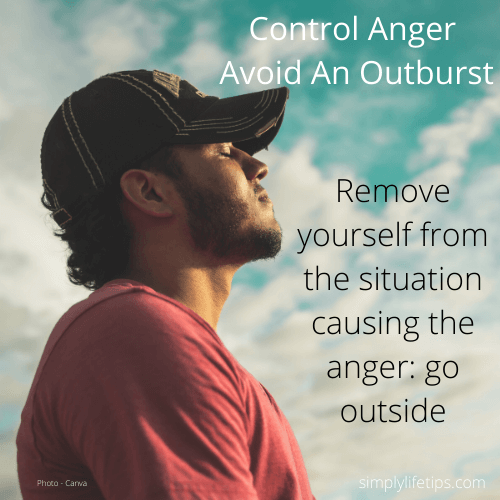Do you have an anger problem? Are you looking for easy ways to control anger?
How To Control Anger With Easy Steps?

If you have difficulty with anger problems, you may find that you have a short temper. Having a temper, or losing your patience and expressing your anger ineffectively, can strain your personal and work relationships. Finding ways to control your temper and reduce outbursts of anger may improve the quality of your life and your interpersonal relationships.
Part 1 – Recognizing the Onset of Anger
1. Think of anger as physiological as well as psychological. When you experience anger, your body undergoes a chemical process that activates your biological “fight or flight” response. For many people, a short temper results in a “fight” response due to a chemical and hormonal response in the brain.
2. Monitor your body for physical reaction. Many people show signs of anger in their bodies, even before they realize that they are feeling anger. You may be heading towards an outburst of anger if you are experiencing any of the following symptoms:
- Tense muscles and clenched jaw
- Headache or stomachache
- Increased heart rate
- Sudden sweating or shaking
- A dizzy feeling

3. Watch for emotional signs. In addition to physical reaction to anger, you will likely begin to experience emotional symptoms before losing your temper. Some emotions that often flare up alongside anger are:
- Irritation
- Sadness or depression
- Guilt
- Resentment
- Anxiety
- Defensiveness
4. Be aware of your triggers. Monitoring your outbursts of temper or thinking about what usually sets you off can help you identify your temper triggers. A trigger is something that happens that makes you have an automatic reaction. Triggers are usually tied to past emotions or memories (even if you aren’t consciously aware of them). Some common triggers for anger include:
- Feeling out of control of your own life, another person’s actions, or your environment or situation
- Believing that someone is trying to manipulate you
- Getting mad at yourself for making a mistake
5. Avoid known triggers. If you are aware of specific circumstances that are likely to trigger your temper, do your best to avoid them. You may particularly need to focus on avoidance if you have other factors that may contribute to a shorter temper such as a lack of sleep, another emotionally-straining event, or increased life or job stress.
- For example, if getting yelled at by your boss is a trigger for your anger, you could avoid the trigger by removing yourself from the situation or asking for a moment to yourself. You can also ask your boss to speak to you more calmly in the future.
6. Reframe your triggers. If you are aware of the emotion or memory that is tied to one of your triggers, try to restructure the memory to lessen the effect of the trigger.
- For example, you may know that your boss yelling at you is a trigger because you were verbally abused as a child, try disassociating the two kinds of yelling. Convincing yourself that your childhood yelling was different because it only happened in a living room may help you separate it from yelling that you experience in the workplace.
7. Feel when your response is escalating. If you feel that the symptoms of your anger are escalating, and you seem to be moving from mildly irritated to really angry, remove yourself from the situation if at all possible. If you can remove yourself to be alone, you can use strategies to reduce or redirect your feelings of anger and avoid an outburst.
Part 2 – Avoiding an Outburst

1. Use progressive muscle relaxation. Progressive muscle relaxation involves tensing and releasing your body in progressive stages. Consciously tensing your own muscles can help you redirect the outlet of the anger you’re feeling. To practice progressive muscle relaxation, take a few deep breaths, then do the following:
- Begin with your face and head muscles. Hold the tension for 20 seconds, then release it.
- Work your way down your body, tensing and releasing your shoulders, arms, back, hands, stomach, legs, feet, and toes.
- Take deep breaths, feeling relaxation from your toes all the way up to your head.
2. Delay responding. If you know that you have become angry and feel that you are about to lose your temper, give yourself the gift of time. Remind yourself that you do not have to respond or react immediately. Leave the situation, think about a reasoned response, then react later, when the anger has subsided.
- If you cannot physically leave, you can still give yourself a delay by stopping to count to 10 (or 20, or 50, or 100) before you respond.
3. Change your scenery. If you begin to lose your temper, change to a new location. If you are inside, go outside for a walk if possible. The combination of leaving the person or situation causing your anger and “shocking” your senses with an entirely new environment can help you regain control.
4. Find humor in the situation. Because anger is, in part, a chemical reaction, if you can change the chemicals in your body, you can circumvent a temper outbreak. Trying to find humor in a situation, or getting yourself laughing about something else, will diffuse the situation by changing your body’s chemical reaction.
- For example, if you find that your children have dumped a bag of flour over your entire kitchen, your initial reaction may be anger. However, if you stop and try to look at the situation objectively (perhaps pretending that it is someone else’s kitchen!), you may be able to laugh about it instead. Having a good laugh and then rallying the troops to help you clean up the mess can turn a negative situation into a funny memory.
5. Take a meditation break. Meditation can help you regulate your emotions. Therefore, if you are feeling as though you are going to lose control of your temper, give yourself a little mental vacation through meditation. Remove yourself from the situation causing the anger: go outside, to a stairwell, or even to the bathroom.
- Take slow, deep breaths. Maintaining this breathing will likely bring down your elevated heart rate. Your breaths should be deep enough that your belly extends on the “in” breath.
- Visualize a golden-white light filling your body as you breathe in, relaxing your mind. When you breathe out, visualize muddy or dark colors leaving your body.
- Once you are calm from your meditation, think about your emotions and decide how to deal with the situation that angered you.
Part 3 – Dealing with Underlying Issues
1. Get plenty of exercise and sleep. Tempers can be heightened (and fuses shorter) if you are lacking sleep or exercise. Sleep can help you regulate your emotions effectively. Exercising when you feel angry can help you redirect your anger. Maintaining regular exercise can help you with mood regulation and controlling your emotions.
2. Try cognitive restructuring. Cognitive restructuring helps you replace automatic negative thoughts with more functional or appropriate ways of thinking. Anger may distort your thoughts, but learning to apply reason to your thoughts can make them clear again and can help you avoid losing your temper.
- For example, you may get a flat tire on your way to work. Your automatic negative thinking caused by anger may lead you to think “My whole day is ruined! I am going to get in trouble at work! Why does this kind of thing always happen to me?!”
- If you restructure your thinking to take a reasoned look at your comments, you may realize that one setback does not automatically ruin your whole day, that your workplace may understand that things like that happen, and that it’s unlikely that this “always” happens to you (unless you get a flat tire daily, in which case you may want to reevaluate your driving).
- It also may help to realize that anger at the situation will not help any; in fact, it could hurt by making it more difficult to focus on finding a solution (such as changing the tire).
3. Participate in an anger management program. Anger management programs have been proven to be highly successful. Effective programs help you understand anger, develop short-term strategies to deal with anger, and build your emotional control skills. There are many options available for finding a program that is right for you.
- Individual programs are available for teens, police officers, executives, and other groups of the population that may experience anger for different reasons.
- To find an anger management program that is right for you, try searching online for “anger management class” plus the name of your city, state, or region. You can also include search terms like “for teens” or “for PTSD” to find a group tailored to your specific situation.
- You can also look for appropriate programs by asking your physician or therapist, or by consulting the self-improvement course offerings at your local community center.
4. Seek therapy. Ultimately, the best way to control your temper is to identify and treat the root of your anger problems. The best way to do this is in a therapist’s office. A therapist can give you relaxation techniques to use in situations that make you feel angry. She can help you develop emotional coping skills and communication training. Additionally, a psychoanalyst who specializes in helping resolve problems from someone’s past (such as neglect or abuse from childhood) can help mitigate anger tied to past events.
Above article provided by wikiHow, a wiki that is building the world’s largest and highest quality how-to manual. Please edit this article and find author credits at the original wikiHow article on How to Control Your Temper. Content on wikiHow can be shared under a Creative Commons License.

Do not seek revenge or bear a grudge against anyone among your people, but love your neighbor as yourself. I am the Lord.
Bible Verses Leviticus 19_18
Final Thoughts
Anger is a dangerous problem. It should be controlled for a happy life. If not controlled timely, anger can make unexpected and unwanted damages in life. Hope you could find useful information to control anger.
Recommended for reading
How do you control Anger?
Share this post on your network and help others to read.

Mathukutty P. V. is the founder of Simply Life Tips. He is a Blogger, Content Writer, Influencer, and YouTuber. He is passionate about learning new skills. He is the Director of PokketCFO.
He lives with the notion of “SIMPLE LIVING, CREATIVE THINKING”. He Believes – “Sharing is caring.” and “Learning never ends.”



